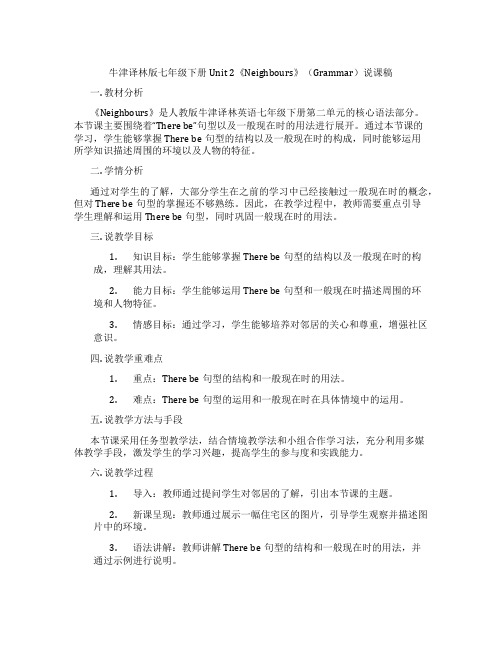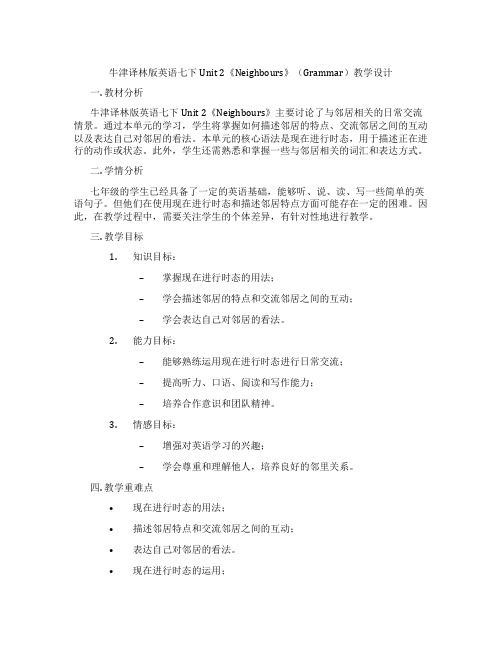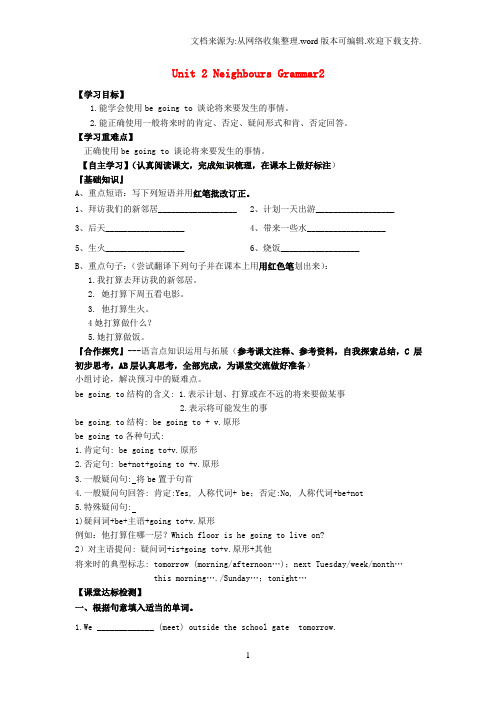译林牛津版七年级英语下册 Unit 2 Neighbours Grammar小练习
Unit 2 Grammar课件初中英语七年级下册(牛津译林版)

help mother do some housework cook dinner for buy her a present/ flower... write a letter/ postcard to her study hard ...
Post-task
一、用正确的时态填空
will
1. Women’ Day is coming.aIm__g_o_i_n_g__t_o_g_i_v_e___ (give) my mother a present.
2. -- What _a_r_e_ you ___g_o_i_n_g__t_o_b__e_ (be) when you
We shall/ will have classes tomorrow.
Will you have classes tomorrow?
Yes, I(we) will / shall.
后天
Will you have classes the day after tomorrow?
No, I (we) wiwllonno’t / shashllanno’t. t t
3W.We e aren’t gnooitndgotooudro outrohnoigmhte=wthoirsk
tonight/this evheonminegw. ork evening
4T.hTehtwe itnwin brontohteprlsayaren’tngeoxitnTguetosdpalyay
Sum up(总结) the time expressions in the simple future tense.
将来时的典型标志:
牛津译林版英语七下Unit 2《Neighbours》(welcome to the unit)教学

牛津译林版英语七下Unit 2《Neighbours》(welcome to the unit)教学设计一. 教材分析牛津译林版英语七下Unit 2《Neighbours》主要讨论了与邻居相关的日常交流用语。
通过本单元的学习,学生将能够掌握与邻居交流的基本用语,描述邻居的特点以及日常生活中与邻居的互动。
本单元主要包括以下几个部分:welcome to the unit、read and write、listen and say、look and say、task、self-check以及word bank。
二. 学情分析学生在进入七年级下学期时,已经具备了一定的英语基础,能够进行简单的英语听说读写活动。
但部分学生对于日常英语交流仍感到困难,特别是在实际应用中,可能出现表达不准确或胆怯的情况。
因此,在教学过程中,需要关注学生的个体差异,鼓励他们积极参与课堂活动,提高他们的自信心。
三. 教学目标1.知识目标:学生能够掌握与邻居交流的基本用语,描述邻居的特点以及日常生活中与邻居的互动。
2.能力目标:学生能够在实际情景中运用所学知识进行日常英语交流,提高他们的口语表达能力。
3.情感目标:学生能够学会尊重他人,培养良好的邻里关系。
四. 教学重难点1.重点:学生能够掌握与邻居交流的基本用语,描述邻居的特点以及日常生活中与邻居的互动。
2.难点:学生在实际情景中运用所学知识进行日常英语交流,特别是听力和口语能力的运用。
五. 教学方法1.情境教学法:通过设置各种与邻居相关的实际情景,让学生在情境中学习与练习英语。
2.交际教学法:鼓励学生积极参与课堂互动,进行真实的英语交流。
3.任务型教学法:通过完成各种任务,让学生在实践中运用所学知识。
六. 教学准备1.教师准备:提前熟悉教材内容,了解学生的学习情况,设计合理的教学活动和任务。
2.学生准备:预习教材内容,了解本单元的学习目标。
七. 教学过程1.导入(5分钟)教师通过提问方式引导学生回顾上一单元学到的内容,如家庭成员的称呼和特点。
牛津译林版七年级英语下册《Unit 2 Neighbours》Grammar教案

《Unit 2 Neighbours》Grammar教案授课时间:年月日总计:课时教学目标: 1.Simple future tense with will and shall2.Simple future tense with be going to教学重点: 1.Simple future tense with will and shall2.Simple future tense with be going to课时安排:4课时教学过程:复备栏Step1 Revision1.Ask some questions about the Simon’s community centre.1)Where does Simon live?2)What do you think of the community centre in his neighourhood3)Do you think Simon lucky to live in such a nighourhood? Why?2.Here are some people who live in Simon’s nighourhood. Theyhave some problems. How can they get help from the communitycentre?Step2 Presentation1.创设情景-What will you do if you have problems with your homework?-I will/shall________.2. What do we use will or shall to talk about?(We use will or sh all to talk about things that will happen andplans that we’re making now. This is an example of the simplefuture tense).1.If someone has problem with his or her ho mework, he or shewill ask the teach er for help. He or she won’t copy the other’sanswers. What’l l you do? Will you ask your teacher for help?Will your parents help you?(Help Ss answer them like “Ye s, I will/shall. No, I will/shall not.Yes, they will. No, they will not).2.Read partA carefully and find out the rulers.(What do we use for “I” or “we”? What do we use for “you”“he” “she” “it” and “they”Step3Practise1.Do the practice of Part A(Simon’s computer is broken. He’s asking Mr. Lin for help.Please complete their conversation with the simple future tense.2.Read the dialogue about Mr Lin and Simon’s.Step4 Presentation1.创设情景(Do you think community centers are helpful? I think they are. Thecommunity centre in my nighourhood is going to have a “helpinghands’ meeting the day after tomorrow. I’m going to teach childrenEnglish songs. My daughter is going to dance for the old people.My parents are going to cook some delicious food.2.What do we use be going t o to talk about?(We use be going to to talk about something w e decide to doand things that wil l probably happen).Step4 Practiceplete part B(Simon is telling Amy about his plan for a day out with hisuncle’s family. Please help him complete his plan).2.Answer these questions with your partner.1)What are you going to do for old people this Sunday?2)What’s your father/mother going to do for your neighourstomorrow?3)What are you going to do for poor children the day aftertomorrow?4)What’s your father/mother going to do for your communitynext week?Step5 Homework1.《课课练》P15.2.预习Integrated skills.教师的职务是‘千教万教,教人求真’;学生的职务是‘千学万学,学做真人’。
牛津译林版英语七年级下册课件Unit2NeighboursGrammar

will ask
will will call wait will wait
be Will
我们除了可以用“will/shall+动词原形” 表示一般将来时外,还可以用
一般将来时的含义:
We use be going to when we talk about:
1. something we decide to do 表示决定、打算将来要做的事情
4.特殊疑问句: 特殊疑问词 + will/shall + 主语 + v. +... When shall I cook supper? Who will you wait for?
What will Andy do next Monday?
对划线部分提问:
1. The flat will belong to Tom next year.Who will the flat belong to next year? 2. My mother will carry all the food. Who will carry all the food? 3. I will eat noodles this evening. When will you eat noodles? 4. Amy will do her homework tonight. What will Amy do tonight?
Be +主语 +going to + v. 3.一般疑问句: Will/Shall +主语 + v.
Yes, it will.
You and I ______ study English tomorrow.
Is the We aren’t going to have an boy exam next wgeeok. ing to play football tomorrow?
牛津译林版七年级下册Unit 2《Neighbours》(Grammar)说课稿

牛津译林版七年级下册Unit 2《Neighbours》(Grammar)说课稿一. 教材分析《Neighbours》是人教版牛津译林英语七年级下册第二单元的核心语法部分。
本节课主要围绕着“There be”句型以及一般现在时的用法进行展开。
通过本节课的学习,学生能够掌握There be句型的结构以及一般现在时的构成,同时能够运用所学知识描述周围的环境以及人物的特征。
二. 学情分析通过对学生的了解,大部分学生在之前的学习中已经接触过一般现在时的概念,但对There be句型的掌握还不够熟练。
因此,在教学过程中,教师需要重点引导学生理解和运用There be句型,同时巩固一般现在时的用法。
三. 说教学目标1.知识目标:学生能够掌握There be句型的结构以及一般现在时的构成,理解其用法。
2.能力目标:学生能够运用There be句型和一般现在时描述周围的环境和人物特征。
3.情感目标:通过学习,学生能够培养对邻居的关心和尊重,增强社区意识。
四. 说教学重难点1.重点:There be句型的结构和一般现在时的用法。
2.难点:There be句型的运用和一般现在时在具体情境中的运用。
五. 说教学方法与手段本节课采用任务型教学法,结合情境教学法和小组合作学习法,充分利用多媒体教学手段,激发学生的学习兴趣,提高学生的参与度和实践能力。
六. 说教学过程1.导入:教师通过提问学生对邻居的了解,引出本节课的主题。
2.新课呈现:教师通过展示一幅住宅区的图片,引导学生观察并描述图片中的环境。
3.语法讲解:教师讲解There be句型的结构和一般现在时的用法,并通过示例进行说明。
4.实践环节:学生分组进行角色扮演,运用There be句型和一般现在时描述邻居的特征。
5.巩固环节:教师设计一系列练习题,让学生进行听力、阅读和写作的训练。
6.总结:教师引导学生回顾本节课所学内容,并进行情感教育。
七. 说板书设计板书设计包括There be句型的结构、一般现在时的构成以及相关例句。
牛津译林版英语七年级下册:Unit 2 Neighbours-Grammar 课件(共23张PPT)

肯定句
We will not meet Ms. Hong in the next lesson. 否定句
Will we meet Ms. Hong in the next lesson? 疑问句
1. will + 动词原形. 肯定句 主语 + will +动词原形+其他 否定句 主语 + will not +动词原形+其他
We will meet Ms. Hong in the next lesson. 肯定句 We will not meet Ms. Hong in the next lesson. 否定句 Will we meet Ms. Hong in the next lesson? 疑问句
Make a new dialogue:
2、明天我们班将会有一个生日派对。
There is going to be a birthday party tomorrow.
We will meet Ms. Hong in the next lesson.
We are going to have a birthday party tomorrow . They are going to have a trip in an hour.
We are going to have a birthday party tomorrow.肯定句
We aren’t going to have a birthday party tomorrow. 否定句 Are you going to have a birthday party tomorrow? 疑问句
牛津译林版英语七下Unit 2《Neighbours》(Grammar)教学设计

牛津译林版英语七下Unit 2《Neighbours》(Grammar)教学设计一. 教材分析牛津译林版英语七下Unit 2《Neighbours》主要讨论了与邻居相关的日常交流情景。
通过本单元的学习,学生将掌握如何描述邻居的特点、交流邻居之间的互动以及表达自己对邻居的看法。
本单元的核心语法是现在进行时态,用于描述正在进行的动作或状态。
此外,学生还需熟悉和掌握一些与邻居相关的词汇和表达方式。
二. 学情分析七年级的学生已经具备了一定的英语基础,能够听、说、读、写一些简单的英语句子。
但他们在使用现在进行时态和描述邻居特点方面可能存在一定的困难。
因此,在教学过程中,需要关注学生的个体差异,有针对性地进行教学。
三. 教学目标1.知识目标:–掌握现在进行时态的用法;–学会描述邻居的特点和交流邻居之间的互动;–学会表达自己对邻居的看法。
2.能力目标:–能够熟练运用现在进行时态进行日常交流;–提高听力、口语、阅读和写作能力;–培养合作意识和团队精神。
3.情感目标:–增强对英语学习的兴趣;–学会尊重和理解他人,培养良好的邻里关系。
四. 教学重难点•现在进行时态的用法;•描述邻居特点和交流邻居之间的互动;•表达自己对邻居的看法。
•现在进行时态的运用;•准确描述邻居特点和交流邻居之间的互动。
五. 教学方法1.情境教学法:通过设定真实的邻里场景,让学生在实际语境中学习和运用英语;2.交际教学法:鼓励学生进行角色扮演,模拟邻里之间的交流,提高口语表达能力;3.任务型教学法:通过完成小组任务,培养学生合作意识和团队精神;4.反馈与激励:及时给予学生反馈,鼓励学生积极参与课堂活动。
六. 教学准备1.教材:牛津译林版英语七下Unit 2《Neighbours》;2.多媒体课件:图片、视频、音频等教学资源;3.学习任务单:用于引导学生进行小组讨论和任务完成;4.板书用品:黑板、粉笔等。
七. 教学过程1.导入(5分钟)利用图片或视频展示邻居之间的日常生活场景,引导学生谈论自己的邻居。
2017牛津译林版七年级下册Unit2NeighboursGrammar2

Unit 2 Neighbours Grammar2【学习目标】1.能学会使用be going to 谈论将来要发生的事情。
2.能正确使用一般将来时的肯定、否定、疑问形式和肯、否定回答。
【学习重难点】正确使用be going to 谈论将来要发生的事情。
【自主学习】(认真阅读课文,完成知识梳理,在课本上做好标注)『基础知识』A、重点短语:写下列短语并用红笔批改订正。
1、拜访我们的新邻居__________________2、计划一天出游__________________3、后天__________________4、带来一些水__________________5、生火__________________6、烧饭__________________B、重点句子:(尝试翻译下列句子并在课本上用用红色笔划出来):1.我打算去拜访我的新邻居。
2. 她打算下周五看电影。
3. 他打算生火。
4她打算做什么?5.她打算做饭。
『合作探究』---语言点知识运用与拓展(参考课文注释、参考资料,自我探索总结,C层初步思考,AB层认真思考,全部完成,为课堂交流做好准备)小组讨论,解决预习中的疑难点。
be going to结构的含义:1.表示计划、打算或在不远的将来要做某事2.表示将可能发生的事be going to结构: be going to + v.原形be going to各种句式:1.肯定句: be going to+v.原形2.否定句: be+not+going to +v.原形3.一般疑问句: 将be置于句首4.一般疑问句回答: 肯定:Yes, 人称代词+ be;否定:No, 人称代词+be+not5.特殊疑问句:1)疑问词+be+主语+going to+v.原形例如:他打算住哪一层?Which floor is he going to live on?2)对主语提问: 疑问词+is+going to+v.原形+其他将来时的典型标志: tomorrow (morning/afternoon…);next Tuesday/week/month…this morning…./Sunday…;tonight…【课堂达标检测】一、根据句意填入适当的单词。
- 1、下载文档前请自行甄别文档内容的完整性,平台不提供额外的编辑、内容补充、找答案等附加服务。
- 2、"仅部分预览"的文档,不可在线预览部分如存在完整性等问题,可反馈申请退款(可完整预览的文档不适用该条件!)。
- 3、如文档侵犯您的权益,请联系客服反馈,我们会尽快为您处理(人工客服工作时间:9:00-18:30)。
Unit 2 Neighbours一.单项选择1. They______ an English evening next Sunday.A. are havingB. are going to haveC. will havingD. is going to have2. _____ you ______ free next Sunday?A. Will; areB. Will; beC. Do; beD. Are; be3. He_______ there at ten tomorrow morning. A. will B. is C. will be D. be4. _______ your brother _______ a maganize from the library?A. Are; going to borrowB. Is; going to borrowC. Will; borrowsD. Are; going to borrows5. ----- Shall I come again tomorrow afte rnoon? -----________.A. Yes, pleaseB. Yes, you willC. No, PleaseD. No, you won't6. It ________ the year of the horse next year. A. is going to be B. is going to C. will be D. will is7. ______ open the window?A. Will you pleaseB. Please will youC. You pleaseD. Do you8. ---- Let's go out to play football, shall we? ----OK. I _______.A. will comingB. be going to comeC. comeD. am coming9. It _______ us a long time to learn English well.A. takesB. costC. spendsD. will spend10.The train ______ at 11.A. going to arriveB. will be arriveC. is going toD. is arriving11. It's very dark and cold. It _______rain.A. willB. shallC. is going toD. are going to12.Jack, with his friends, _______ see Mr Li tomorrow.A. is going toB. are going toC. go toD. will goes13. It _______ my brother’s birthday tomorrow. He _______ a party.A. is going to be; will haveB. will be; is havingC. will be; is going to haveD. will have; is going to be14. Li Ming is 10 years old now, next year he _______11.A. isB. is going to beC. will beD. will to be15. ______ you _______ a doctor when you grow up?A. Will; going to beB. Are; going to beC. Are;/D. Will; be16. I don't know if his uncle _______. I think he ________if it doesn't rain.A. will come; comesB. will come; will comeC. comes; comesD. comes; will come17. He will be back _______ a few minutes. A. with B. for C. on D. in18. What time _______ we meet at the gate tomorrow?A. willB. wouldC. doD. are19.He will have a holiday as soon as he _______ the work next week.A. finishesB. doesn't finishC. will finishD. won't finish20. Why _______ they leaving for New York in only one week?A. areB. willC. shallD. is二.用所给动词的适当形式填空.1. Kitty_______(return) to school the day after tomorrow.2. We _______(meet) at the school gate at 8 a.m. tomorrow, shan’t we?3. My parents ________(have) a trip to Sunzhou next week.4. It's so sunny. I don't think it ___________(rain).5. ----- _______Jim _______(join) in the next basketball match? ---- Of course he is.6. ---- ______ you ________(arrive) at the airport soon? ----- Yes, of course.7. There are too many black clouds in the sky. I ________(take) my umbrella with me.8. There __________(be)a volleyball match in our playground this afternoon.9. They _________ (arrive) home in thirty minutes.10. He _________(want) to be a teacher when he grows up.三.句型转换1. Justin and Paul will grow some flowers there.(对划线部分提问)________ will Justin and Paul _______ there?2. They will take their umbrellas with them tomorrow.(改为否定句)They _______ ________ take their umbrellas with them tomorrow.3. Kate will return to Nanjing in a week.(对划线部分提问)_______ ________ will Kate return to Nanjing?4. The students are swimming in the river now. (用this afternoon替换now)The students _______ __________ in the river this afternoon.5. Let's find someone to fix this broken computer.(完成反意疑问句)Let's find someone to fix this broken computer, ________ _________?6. The parents will take their daughter to the hospital tomorrow.(改为否定句)The parents ________ ________ their daughter to the hospital tomorrow.7. Bill is going to watch TV this afternoon. (改为一般疑问句)______ Bill _______ to watch TV t his afternoon?8. We shall meet at the school gate.(对划线部分提问) ______ ________ we meet?9. My cousin will fly to Shanghai next week.( 对划线部分提问)________ _________ your cousin ________ next week?10. Where shall we have a bi g farewell party? (改为同义句)Where _______ we _______ ________ have a big farewell party.。
